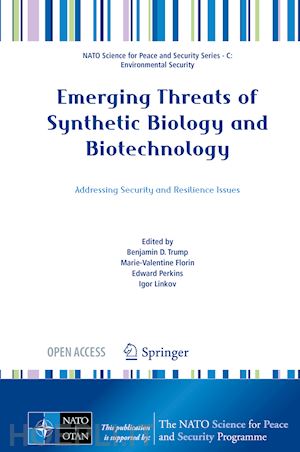
Questo prodotto usufruisce delle SPEDIZIONI GRATIS
selezionando l'opzione Corriere Veloce in fase di ordine.
Pagabile anche con Carta della cultura giovani e del merito, 18App Bonus Cultura e Carta del Docente
Benjamin D. TRUMP
Dr. Benjamin D. TRUMP is a Research Social Scientist for the US Army Corps of Engineers.
Dr. Trump’s work focuses on decision making and governance of activities under significant
uncertainty, such as emerging and enabling technologies (synthetic biology, nanotechnology)
and developing organizational, infrastructural, social, and informational resilience against
systemic threats to complex interconnected systems. Dr. Trump served as a delegate to assist US
presence in OECD’s Global Science Forum in 2017, and was the President of the Society for
Risk Analysis’ Decision Analysis and Risk Specialty Group in 2018-2019, as well as its
Resilience Analysis Specialty Group in 2019-2020. He was selected as a Fellow of the Emerging
Leaders in Biosecurity Initiative, Class of 2019. In December 2020, Dr. Trump was installed as
the Treasurer of the Society for Risk Analysis. Dr. Trump was also a contributing author ofthe
International Risk Governance Council’s Guidelines for the Governance of Systemic Risks, as
well as their 2nd Volume of the Resource Guide on Resilience. Dr. Trump is also frequently
active with several Advanced Research Workshops for the North Atlantic Treaty Organization’s
Science for Peace Programme. Co-authored with Dr. Igor Linkov, Dr. Trump’s book The Science
and Practice of Resilience (2019) includes a detailed discussion of the methodological,
philosophical, and governance-related work behind the concept of resilience. His follow-up book
with Dr. Myriam Merad, Expertise Under Scrutiny (2020), addresses the challenges facing
decision makers of how to construct and implement scientifically formed and institutionally valid
decisions within an environment of heightened uncertainty and public criticism. Dr. Trump
received his Ph.D. from the University of Michigan’s School of Public Health, Department of
Health Management and Policy in 2016. He received an M.S. (2012) in Public Policy and
Management and a B.S. in Political Science (2011) from Carnegie Mellon University.
Marie-Valentine FLORIN
Marie-Valentine Florin is the Executive Director of the International Risk Governance Center
(IRGC), at Ecole Polytechnique Fédérale de Lausanne (EPFL) in Switzerland. IRGC acts at the
interface between science and policy and is particularly active about risks related to emerging
technologies, marked by complexity, uncertainty and ambiguity. She continues to develop the
concepts and guidelines for risk governance established by the IRGC Foundation, with a focus
on emerging and systemic risks, for which the risk and the resilience governance perspectives are
relevant. She convenes multi-stakeholder groups of experts to consider the particular risks and
governance challenges that arise in specific sectors such as digital technologies, climateengineering, nanotechnology, or synthetic biology. Before joining the IRGC Foundation in 2006,
Ms Florin spent the first part of her career (1984-1999) in an international socio-cultural research
and marketing consulting firm. She graduated from Science Po in Paris (public policy and
management) and then earned post-graduate diplomas in marketing strategy, sustainable
development and environmental diplomacy. She is Society for Risk Analysis Fellow and amember of the Advisory Board to the Global Risk Report of the World Economic Forum.
Edward J. PERKINS
Dr. Edward J. PERKINS is currently the Acting Army Deputy Chief Scientist and Army Senior
Research Scientist for Environmental Networks and Genetic Toxicology with the Army Corps of
Engineers. His work focuses on using genetics and biotechnology to assess chemical hazardsand develop novel applications to support Army activities including new materials andsynthetic
biology. Dr. Perkins provides guidance for the Army and Department of Defense (DoD) on basic
and applied research programs, in addition to consulting on issues of national and international
importance for the Army Corps of Engineers, Department of Defense, the United States
Environmental Protection Agency, and the Organization for Economic Cooperation andDevelopment. He has published widely on genetics, toxicology and novel approaches for risk
assessment, including 4 books and over 150 peer reviewed manuscripts and book chapters. Dr.
Perkins has served many organizations as an expert panelist and has been a co-organizer for
multiple national and international workshops and conferences. Dr Perkins received his Ph.D. in
Genetics and Cell Biology from Washington State University in 1987 and a B.A. in Geneticsfrom University of Illinois in 1983. He completed his postdoctoral training in genetics at the
Universityof











Il sito utilizza cookie ed altri strumenti di tracciamento che raccolgono informazioni dal dispositivo dell’utente. Oltre ai cookie tecnici ed analitici aggregati, strettamente necessari per il funzionamento di questo sito web, previo consenso dell’utente possono essere installati cookie di profilazione e marketing e cookie dei social media. Cliccando su “Accetto tutti i cookie” saranno attivate tutte le categorie di cookie. Per accettare solo deterninate categorie di cookie, cliccare invece su “Impostazioni cookie”. Chiudendo il banner o continuando a navigare saranno installati solo cookie tecnici. Per maggiori dettagli, consultare la Cookie Policy.